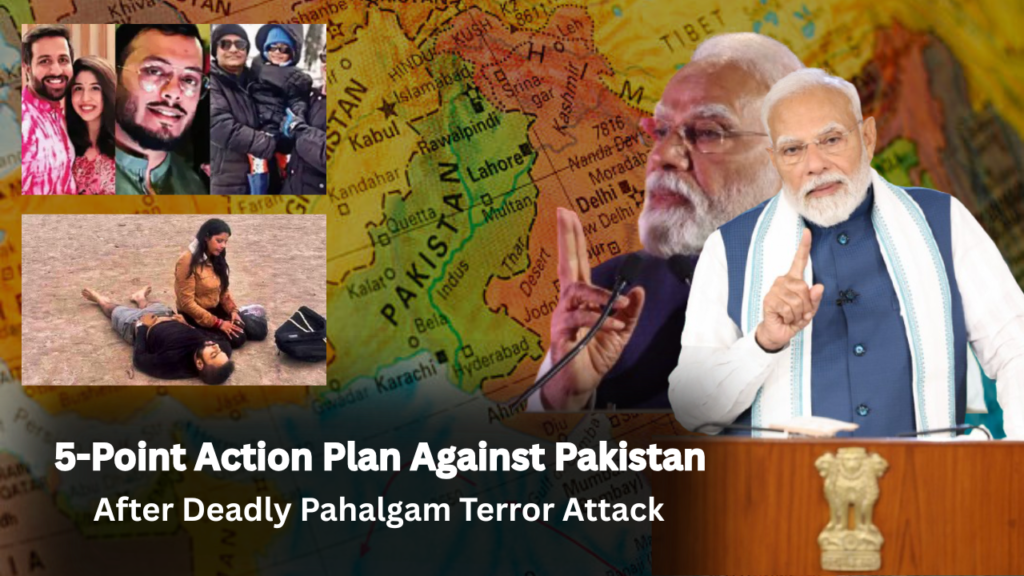
In a decisive response to the recent Pahalgam terror attack that claimed 26 lives, including a foreign national, India has announced a robust five-point strategy targeting Pakistan’s diplomatic and cross-border ties. The attack, which occurred in Jammu and Kashmir’s tourist haven Pahalgam, has been linked to militant groups allegedly operating from Pakistani soil.
The Cabinet Committee on Security (CCS), chaired by Prime Minister Narendra Modi, convened an emergency meeting attended by senior leaders including Home Minister Amit Shah, Defence Minister Rajnath Singh, External Affairs Minister S. Jaishankar, and National Security Advisor Ajit Doval.
Here’s a detailed look at India’s 5-point action plan:
🔴 1. Suspension of the Indus Water Treaty (1960)
India has suspended the Indus Waters Treaty, a water-sharing agreement brokered by the World Bank and signed in 1960. This marks a historic shift in Indo-Pak relations. The suspension is being positioned as a strategic pressure point to prevent Pakistan’s alleged support for cross-border terrorism. India will now review and potentially reconfigure its water flow management from rivers like the Beas, Ravi, and Sutlej.
📌 Why It Matters:
Under its terms, India controls the eastern rivers (Ravi, Beas, Sutlej), while Pakistan receives unrestricted access to the western rivers (Indus, Jhelum, Chenab). India’s move to reconsider water flow from the western rivers could reduce water supply to Pakistan’s Punjab and Sindh provinces, affecting irrigation and hydroelectric power.
📌 Impact on Pakistan:
- Agricultural disruption in Pakistan’s food-producing belt.
- Energy shortfalls in key regions that depend on hydroelectric power.
- International alarm as India challenges a long-standing peace-time treaty, putting pressure on Pakistan to return to dialogue or face further isolation.
🔴 2. Closure of the Attari-Wagah Border
The iconic Attari-Wagah border check post, a symbol of people-to-people connectivity and trade, has been closed indefinitely. Movement of people and goods through this route is now suspended. Individuals currently in India with valid documentation are being permitted to return by May 1, 2025.
📌 Why It Matters:
The Attari-Wagah crossing is a symbolic and practical connection between the nations. It supports not just trade but also cultural and religious exchange, including Sikh pilgrimages to Pakistan’s Kartarpur Sahib.
📌 Impact on Pakistan:
- Loss of cross-border trade revenue, impacting small-scale businesses on both sides.
- Strained people-to-people ties, especially for divided families and religious tourism.
- Negative signal to the international community about the deepening Indo-Pak rift.
🔴 3. Revocation of SAARC Visa Exemption Scheme (SVES) for Pakistani Nationals
India has revoked the SAARC Visa Exemption Scheme for Pakistani nationals. All valid visas under the SVES have been canceled, and a 48-hour deadline has been given to Pakistani citizens currently in India to leave.
📌 Why It Matters:
The SVES facilitated free movement for diplomats, officials, and cultural exchange under the South Asian Association for Regional Cooperation (SAARC) framework. Revoking this scheme symbolically weakens regional cooperationand limits Pakistan’s diplomatic outreach within South Asia. This move effectively curtails diplomatic and people-to-people interaction under the regional cooperation framework.
📌 Impact on Pakistan:
- Diplomatic embarrassment within SAARC and reduced soft power projection.
- Restriction on track II diplomacy and peace-building initiatives.
🔴 4. Expulsion of Pakistani Military Advisors
All Pakistani military, naval, and air force advisors stationed at the Pakistan High Commission in New Delhi have been declared persona non grata. They have been given seven days to leave India. In a reciprocal move, India will withdraw its own military attachés from Islamabad.
📌 Why It Matters:
Military interactions are crucial for backchannel communication, intelligence monitoring, and crisis management. This move signals a total breakdown in military-to-military trust, increasing the risk of miscalculation in border zones.
📌 Impact on Pakistan:
- Loss of military diplomatic access to India’s strategic outlook and defense policies.
- Escalation of mistrust, especially along the LoC (Line of Control).
- Pakistan’s diplomatic mission in India now significantly weakened.
🔴 5. Reduction of Diplomatic Personnel
India is set to downsize its diplomatic staff in Pakistan. The Indian High Commission in Islamabad will reduce its personnel from 55 to 30 by May 1, 2025, further shrinking bilateral diplomatic engagement
📌 Why It Matters:
A reduction in diplomatic presence signals a near-freeze in bilateral ties. With fewer officials on ground, routine consular services, cultural exchange, and policy communication are hampered.
📌 Impact on Pakistan:
- Limits on India’s outreach to Pakistani civil society.
- Reduced scope for handling emergencies or consular issues involving Indian nationals.
- Reciprocal measures from Pakistan expected, leading to a diplomatic stalemate.
Investigations & Ground Action:
Following the attack, joint operations by the Indian Army and J&K Police have intensified in South Kashmir. Preliminary intelligence indicates the attack was executed by a group of seven militants, including Pakistani nationals affiliated with Lashkar-e-Taiba (LeT), a proscribed terror outfit. Home Minister Amit Shah visited the attack site and met with the injured victims in Srinagar hospitals.
National and Global Reactions:
The incident has drawn sharp condemnation both domestically and internationally. The United States, United Kingdom, and France have expressed solidarity with India and urged Pakistan to take concrete action against terror networks operating from its territory. The United Nations Secretary-General also called for restraint but emphasized the need for justice.
India’s post-Pahalgam response is not just a security move but a diplomatic doctrine shift. Each measure is designed to isolate Pakistan both regionally and globally. As investigations into the terror attack progress, India has made it clear that it will hold perpetrators — and their state sponsors — accountable, not just on the battlefield but in international forums as well.
#phalgamterrorattack #Indiapakistanrelations #induswatertreaty #SAARCVisa #attariwagahborder #indiadiplomaticaction #nationalsecurity #jammukashmirnews